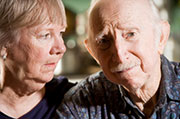- Double Mastectomy May Offer No Survival Benefit to Women With Breast Cancer
- Toxic Lead Found in Cinnamon Product, FDA Says
- Certain Abbott Blood Sugar Monitors May Give Incorrect Readings
- Athletes Can Expect High Ozone, Pollen Counts for Paris Olympics
- Fake Oxycontin Pills Widespread and Potentially Deadly: Report
- Shingles Vaccine Could Lower Dementia Risk
- Your Odds for Accidental Gun Death Rise Greatly in Certain States
- Kids From Poorer Families Less Likely to Survive Cancer
- Tough Workouts Won’t Trigger Cardiac Arrest in Folks With Long QT Syndrome
- At-Home Colon Cancer Test Can Save Lives
After Stroke, Spouse May Also Need Care


If your spouse has a stroke, and the two of you disagree about the rate of recovery, your own health might suffer, a new study finds.
The caregiving spouse is at increased risk for emotional distress and depression if the couple has different perceptions of the post-stroke progress, researchers found.
Stroke care needs to switch from focusing only on the patient to regarding the patient and spouse as one unit, suggested Michael McCarthy, a social work researcher at the University of Cincinnati.
“How the spouse is doing matters in the equation,” McCarthy said.
“They need as much care, if not more in some ways, as the patient,” he added. “We need to bring partners together in the rehabilitation process, to align each person’s expectations and perceptions in order to achieve the best outcomes.”
His study included 35 couples in which one spouse had suffered a stroke within the past three years. The patients and their spouses were interviewed separately about the stroke survivor’s recovery, including their ability to do daily tasks, and their memory and problem-solving skills.
Compared to the stroke survivors, the spouses felt that the recovery was going much slower. This difference was associated with depression in the spouses.
“So if the wife has a stroke and she believes, for example, that she can still drive but her husband doesn’t — the difference in their perception is predictive of the husband’s emotional distress,” McCarthy said in a university news release.
“We were able to quantify and capture a different kind of worry and stress that caregiving spouses can experience and connect it to their outcomes,” he added.
The study was recently published online in the journal Aging & Mental Health.
The degree of difference in how couples view stroke recovery is important in assessing the risk of depression in spouses of stroke survivors, said McCarthy. And if a spouse develops depression, it can “cycle back” onto the stroke survivor, he noted.
Some evidence suggests that wives may be particularly susceptible to worry in such cases, as well as spouses in strong, fulfilling relationships, McCarthy said.
More information
The U.S. National Library of Medicine has more about stroke rehabilitation.
Source: HealthDay
Copyright © 2024 HealthDay. All rights reserved.










